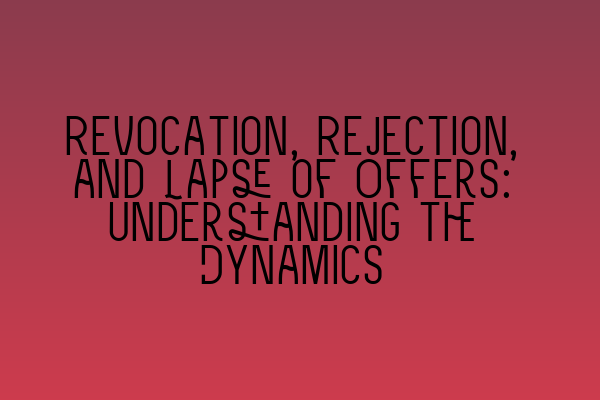Revocation, Rejection, and Lapse of Offers: Understanding the Dynamics
In the world of contract law, offers are the building blocks upon which deals are made. An offer represents a promise by one party to enter into a contract with another party, and it is the first step in the contract formation process. However, it’s important to understand that offers are not set in stone and can be revoked, rejected, or lapse under certain circumstances. In this article, we will delve into the dynamics of revocation, rejection, and lapse of offers to provide you with a comprehensive understanding of these concepts.
Revocation of Offers
Revocation refers to the act of withdrawing an offer before it is accepted by the offeree. While an offer is generally revocable, there are certain exceptions to this rule. According to the principle of unilateral contracts, an offer cannot be revoked once the offeree has begun performance of the requested act. This prevents the offeror from reneging on their promise once the offeree has taken action based on the offer.
It’s important to note that revocation of an offer must be communicated effectively to the offeree. Simply having a change of heart or failing to respond to the offeree’s acceptance does not constitute revocation. Communication of revocation can be done through any reasonable means, such as verbal communication, written communication, or even actions that indicate a clear intention to revoke the offer.
Rejection of Offers
Rejection occurs when the offeree declines the offer made by the offeror. This can be done explicitly by stating that the offer is rejected or implicitly by making a counteroffer. A counteroffer is a new proposal made by the offeree, which terminates the original offer. Once a rejection is made, the offer is no longer valid and cannot be accepted at a later time. It’s crucial for both parties to clearly communicate their intentions to avoid any confusion or misunderstandings.
Lapse of Offers
Lapse refers to the expiration of an offer due to the passage of time or the occurrence of a specific event. In general, an offer will lapse if it is not accepted within a reasonable time period. What constitutes a reasonable time depends on various factors, such as the nature of the contract, the subject matter, and the circumstances surrounding the offer.
Additionally, offers may also lapse if a specific event occurs that renders the offer impossible or impracticable to fulfill. For example, if an offer is made to purchase a specific property and the property is destroyed before the offer is accepted, the offer would lapse due to impossibility.
Final Thoughts
Understanding the dynamics of revocation, rejection, and lapse of offers is essential in navigating the complexities of contract law. As a solicitor, it is crucial to advise your clients on these concepts to ensure that their rights and interests are protected. If you’re interested in learning more about the legal field and how you can excel in your career, check out our related articles:
– Mentorship for Aspiring Solicitors: Nurturing Talent in the Legal Field
– Legal Challenges and Pitfalls: Navigating the Complexities of the Legal System
– The Benefits of Becoming a Solicitor: A Rewarding Career
– Law School in the UK: Your Guide to Starting Your Legal Journey
– Striking a Balance: Work-Life Harmony in the Legal Field
By staying informed and continuously improving your knowledge in contract law and related areas, you can become a trusted advisor to your clients and make a significant impact in the legal industry.
If you have any questions or would like to discuss contract law further, don’t hesitate to contact us at SQE Contract Law. We are here to assist you.
